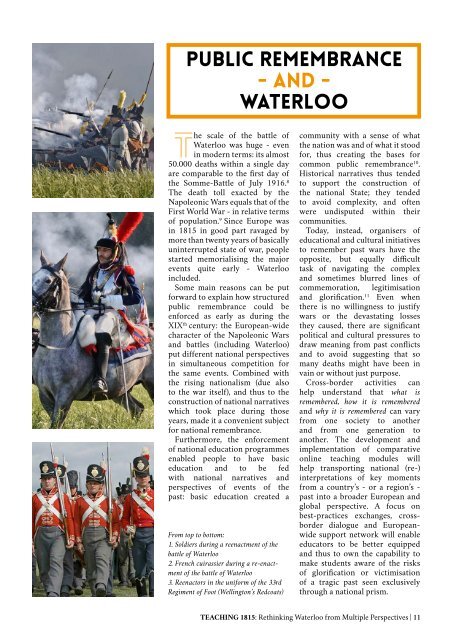Teaching 1815 - Rethinking Waterloo from multiple perspectives (Francesco Scatigna, EUROCLIO)
Teaching 1815 - Rethinking Waterloo from multiple perspectives (Francesco Scatigna, EUROCLIO)
Teaching 1815 - Rethinking Waterloo from multiple perspectives (Francesco Scatigna, EUROCLIO)
You also want an ePaper? Increase the reach of your titles
YUMPU automatically turns print PDFs into web optimized ePapers that Google loves.
public remembrance<br />
- and -<br />
<strong>Waterloo</strong><br />
The scale of the battle of<br />
<strong>Waterloo</strong> was huge - even<br />
in modern terms: its almost<br />
50.000 deaths within a single day<br />
are comparable to the first day of<br />
the Somme-Battle of July 1916. 8<br />
The death toll exacted by the<br />
Napoleonic Wars equals that of the<br />
First World War - in relative terms<br />
of population. 9 Since Europe was<br />
in <strong>1815</strong> in good part ravaged by<br />
more than twenty years of basically<br />
uninterrupted state of war, people<br />
started memorialising the major<br />
events quite early - <strong>Waterloo</strong><br />
included.<br />
Some main reasons can be put<br />
forward to explain how structured<br />
public remembrance could be<br />
enforced as early as during the<br />
XIX th century: the European-wide<br />
character of the Napoleonic Wars<br />
and battles (including <strong>Waterloo</strong>)<br />
put different national <strong>perspectives</strong><br />
in simultaneous competition for<br />
the same events. Combined with<br />
the rising nationalism (due also<br />
to the war itself), and thus to the<br />
construction of national narratives<br />
which took place during those<br />
years, made it a convenient subject<br />
for national remembrance.<br />
Furthermore, the enforcement<br />
of national education programmes<br />
enabled people to have basic<br />
education and to be fed<br />
with national narratives and<br />
<strong>perspectives</strong> of events of the<br />
past: basic education created a<br />
From top to bottom:<br />
1. Soldiers during a reenactment of the<br />
battle of <strong>Waterloo</strong><br />
2. French cuirassier during a re-enactment<br />
of the battle of <strong>Waterloo</strong><br />
3. Reenactors in the uniform of the 33rd<br />
Regiment of Foot (Wellington’s Redcoats)<br />
community with a sense of what<br />
the nation was and of what it stood<br />
for, thus creating the bases for<br />
common public remembrance 10 .<br />
Historical narratives thus tended<br />
to support the construction of<br />
the national State; they tended<br />
to avoid complexity, and often<br />
were undisputed within their<br />
communities.<br />
Today, instead, organisers of<br />
educational and cultural initiatives<br />
to remember past wars have the<br />
opposite, but equally difficult<br />
task of navigating the complex<br />
and sometimes blurred lines of<br />
commemoration, legitimisation<br />
and glorification. 11 Even when<br />
there is no willingness to justify<br />
wars or the devastating losses<br />
they caused, there are significant<br />
political and cultural pressures to<br />
draw meaning <strong>from</strong> past conflicts<br />
and to avoid suggesting that so<br />
many deaths might have been in<br />
vain or without just purpose.<br />
Cross-border activities can<br />
help understand that what is<br />
remembered, how it is remembered<br />
and why it is remembered can vary<br />
<strong>from</strong> one society to another<br />
and <strong>from</strong> one generation to<br />
another. The development and<br />
implementation of comparative<br />
online teaching modules will<br />
help transporting national (re-)<br />
interpretations of key moments<br />
<strong>from</strong> a country’s - or a region’s -<br />
past into a broader European and<br />
global perspective. A focus on<br />
best-practices exchanges, crossborder<br />
dialogue and Europeanwide<br />
support network will enable<br />
educators to be better equipped<br />
and thus to own the capability to<br />
make students aware of the risks<br />
of glorification or victimisation<br />
of a tragic past seen exclusively<br />
through a national prism.<br />
TEACHING <strong>1815</strong>: <strong>Rethinking</strong> <strong>Waterloo</strong> <strong>from</strong> Multiple Perspectives | 11


